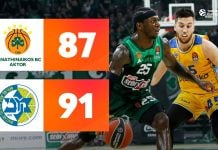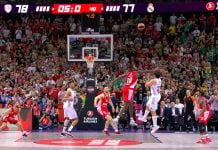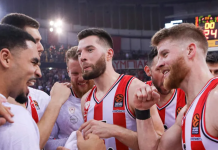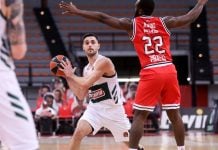For Luca Banchi, the 2018-19 season may not have been the most successful in his career, despite the fact that he won the Intercontinental Cup with AEK Athens, but it must definitely have been one of the most memorable ones. Taking over the reins of one historic club that had managed to cover a big distance from Greece’s third division to the Basketball Champions League title, Banchi’s work was by no means easy.
The Italian coach and the “Queen” officially parted ways last Monday (17th of June) by mutual consent, as stated in the press release issued by the club. It was a rather predictable outcome after AEK Athens not only failed to hold on to either of its titles (Greek Cup and BCL), but was also eliminated by Promitheas Patras in the Greek League semi-finals, missing out on the chance to make the final series against Panathinaikos. In fact, Banchi’s successor, Ilias Papatheodorou, has already been announced and will be officially presented to the media later in the day (21st of June).
TalkBasket.net met Luca Banchi in his office at the OAKA Indoor Hall just ten minutes after the official farewell announcement had been posted and the 53-year-old Grosseto-born coach took more than an hour of his time to answer to an array of questions, concerning his presence in Greece for almost an entire year. Apart from the reasons for his “arrivederci”, coach Banchi offered some interesting insights into his experience, citing names and pulling no punches.
Q: Coach Banchi, your stint with AEK it’s over and so is the 2018-19 season. What is the taste left in you?
A: The conclusion of this season does not change the good taste that I had defending the colours of this prestigious club. I felt very proud of the choice made by the club in the summer, very involved in trying to develop and stabilize this program. I know that my decision -because it was mine- first to ask for a one-year contract and then to refuse the extension of the contract proposed to me may have seemed an irrelevant choice and against the will of giving stability to the programme.
But for me there were so many changes, so many new things and I had to measure myself in a league that did not know and mostly in a club I did not know. I think it was crucial to explore the whole season to see if there could really be the conditions to continue. If you are going to build a long relationship, it has to be born from ideal conditions and because both parties would consider this the best choice. That was the reason why I opted for a one-year contract and it was my will not to renew it, at a time when it would be more convenient for me to try to get a multi-year contract that I have not pursued in order to protect my experience.
Q: Which are “the ideal conditions”?
A: You always think that a coach should have many years of contract in order to feel and look secure and protected by the club, in the eyes of the players and of the public opinion. At my age and with my resume, I think that this cliché could easily be ommitted and that we could work with extreme concreteness. And this is how I wanted to experience this season: taking into consideration my choice not to continue with AEK, but also having the desire to explore the situation until the last day. I was comforted to see the team continue to play with seriousness, with commitment and involvement, in spite of the fact that we had seen our goal of reaching the Greek League finals fade away.
Q: Was this the main objective?
A: It was not, but it became the main one. We must be realistic. When I arrived in Greece, the club asked me to try to work a bit on its work ethic because I would be and I have been the first coach of AEK’s recent history that managed to both start and finish the season. No one had managed to sit on that bench from August to June. And then, there was the will to change direction because the feeling from last year, expressed by Angelopoulos (owner of the club) and Dragan Sakota (general manager), was that in spite of the results, the team had not been able to ensure a day-to-day engagement, enhancing the performance of the players that it had in its interior. This was asked of me from day one and I believe that no one can state otherwise.
We started the season in mid-August and we are heading towards the end of June. Most players started and finished the season and were engaged almost every day on four different levels of competition: the Greek Cup, the Greek League, the BCL and the Intercontinental Cup, never raising their heads and dealing with many difficulties. That notwithstanding, it has been gratifying seeing the team continue to work with seriousness and dedication, in spite of the fact that we came up short of the objectives that were not those set in the beginning of the season, when I was asked explicitly to contribute to the creation of a style and an identity in coaching and training the squad.

Luca Banchi also answered other pertinent questions:
Q: Looking at the roster of AEK, one cannot help but notice a curiosity: with the exception of Larentzakis, all the Greek players are either younger than 22 or older than 34. Is it because all the good native players are recruited by Panathinaikos and Olympiacos? In this respect, one could argue for instance that Kaselakis and Katsivelis of Promitheas Patras played with AEK in the past and had no impact on the team. On the other hand, there has been a lot of American players too, like Michael Eric, whose performance was way below standards.
A: I wasn’t here when those players were on the team. Therefore, you should probably ask the same question to the coaches of AEK at the time. I agree that Katsivelis and Kaselakis are good players, but playing for this club is hard. It’s because of the tradition and the pressure that prevails. Playing for AEK cannot be compared with playing for any Greek team other than Olympiacos or Panathinaikos. It’s not only the case of Eric. I was told that also the starter center of Hapoel Jerusalem (Josh Owens) had been with the team some years ago, but he was “cut” a few days after he played a couple of games.
As for the young/old players part, that’s a really good observation. Let me give you an example: In the beginning of the season, when our center Vasilis Kavvadas was injured, I asked about the case of Kaklamanakis. I was told that he’s under contract with Lavrio and we couldn’t get him. Now, it’s no surprise to me that he’s on his way to Olympiacos.
Q: Is it true that AEK has a deal with Paris Lee, who played for the Antwerp Giants this year?
A: I don’t know. He is a very good player. This question should be addressed to the next coach of AEK. The only thing I can say is that at one point in the season I was asked if I thought he was good and I said yes. Nothing else. I took no part in any talks. That was done by the GM.
Q: How did you deal with the forfeited games and all the things going on in the Greek League?
A: It’s a pity that I was in Greece in what was probably the worst season ever in Greek basketball. It seems to me that the requests of Olympiacos have little to do with basketball and more to do with politics. They don’t simply ask for better officiating, but they want to change the structure of the Greek Federation.
The forfeited games was one of the worst experiences I had while in Greece. A few days after Panathinaikos didn’t play against Kymi, I called Lavrio BC’s coach (Christos Serelis) on the phone just to express my support to my colleague that saw his team get relegated because of what happened. I didn’t have his number nor did I know him personally, but to go through an ordeal like that is very bad for any coach.
Q: AEK fans didn’t support the team throughout the season, with the exceptions of the Intercontinental Cup and a couple of BCL games. Do you think it has to do with the realization that the team is unable to question the supremacy of Panathinaikos and Olympiacos or with the possibility that they are fed up with the BCL? I’m saying this because many fans vividly support the BCL choice in their social media interaction, but when it comes to the games, their presence is usually limited to less than 3,000.
A: I don’t know what AEK fans say on social media, but from what I understood, the attendance in basketball games in Greece grows according to the level of the competition. Fans of Panathinaikos and Olympiacos go to Euroleague matches, but avoid the Greek League games because of the lack of competition. We have a lot of problems in Italian basketball too, but the gyms are full. In Greece, with the exception of Limnos -and I’m talking about local fans- I did not see a warm atmosphere anywhere else.
In the initial talks with the club’s management, I was informed that the budget was inferior to last year’s. We managed to get experienced players like Maciulis, but we also had to take risks in the cases of Rathan-Mayes and Roberson. In our first game in the BCL, Hapoel Jerusalem seemed unbeatable, but later we found our rhythm despite our injuries and fiished first in our group. We were then considered as the number one favourite to win the trophy. When we played PAOK and Bamberg at OAKA, it was very difficult for the players to manage the excitement and the size of the crowd, as they were used to playing in an almost empty arena and they suddenly had to adapt to a new environment.
AEK is staying in the BCL, trying also to raise the level of the competition and there is some progress compared to last year. I would love to play all the time against teams like Hapoel Jerusalem and Bamberg and not against Lietkabelis, for instance. This year (2018-19), the BCL was much more difficult.
Q: Can AEK follow the example of Virtus Bologna and aim higher? What do you think about what Gianni Petrucci (president of the FIP) said about them?
A: It’s not realistic to think that AEK can play in the Euroleague in such conditions. Many teams have tried it in the past and faced great problems because they were not prepared for the transition. Virtus wants to create a second spot for Italian teams in the Euroleague. Right now, only Armani Milan can participate. Petrucci feels exposed because he made sure they would be given a wild card to play in the BCL this season and now they say that they want to play in the Eurocup. The issue is political. If Virtus had not won the BCL, they would not be able to participate in European competitions.
Q: If Rick Pitino eventually decides to stay with Panathinaikos, what do you think his impact can be?
A: Some people perceive Pitino as a snob because of what he’s saying. Well, he’s not like that at all! Pitino just asks for better working conditions, as any coach would do. If I am a coach, I will do anything to ensure the best training conditions, the best facilities and even a private jet for the team to travel. It would be interesting to see if Pitino can change a few things for the better of Greek basketball.

















